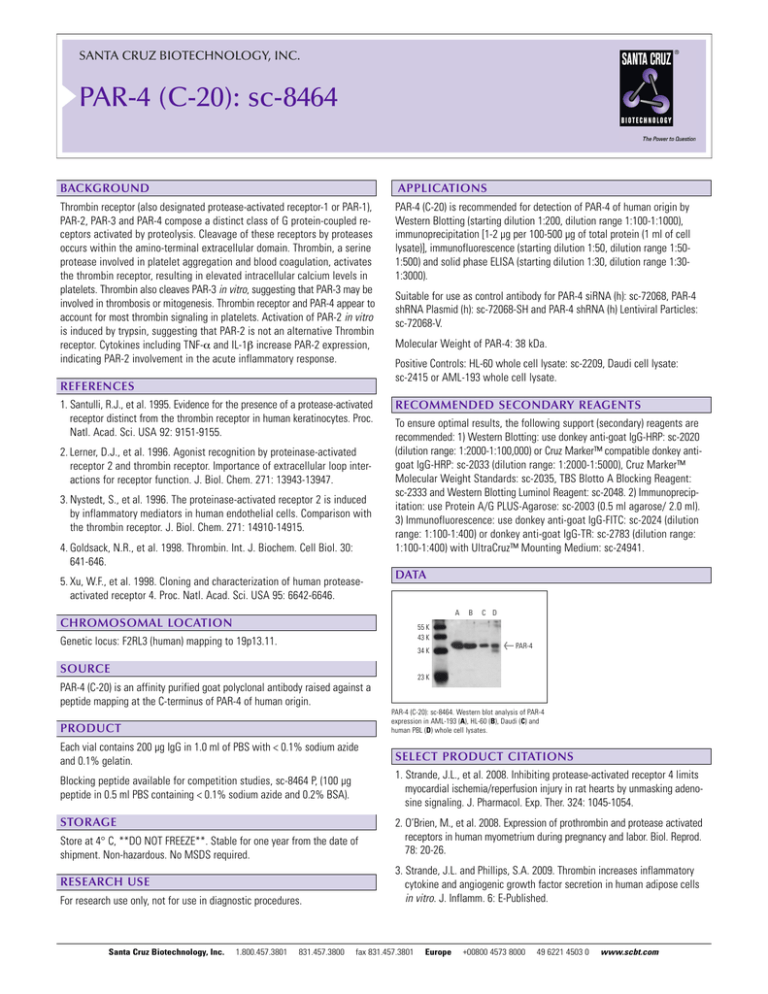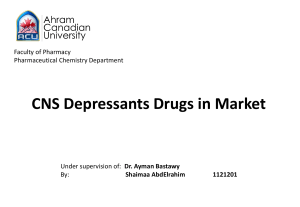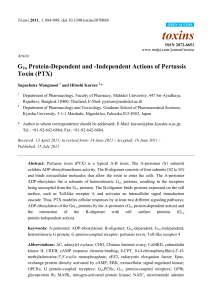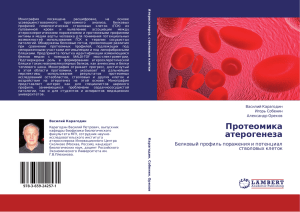PAR-4 (C-20): sc-8464 - Santa Cruz Biotechnology, Inc.
реклама

SANTA CRUZ BIOTECHNOLOGY, INC. PAR-4 (C-20): sc-8464 BACKGROUND APPLICATIONS Thrombin receptor (also designated protease-activated receptor-1 or PAR-1), PAR-2, PAR-3 and PAR-4 compose a distinct class of G protein-coupled receptors activated by proteolysis. Cleavage of these receptors by proteases occurs within the amino-terminal extracellular domain. Thrombin, a serine protease involved in platelet aggregation and blood coagulation, activates the thrombin receptor, resulting in elevated intracellular calcium levels in platelets. Thrombin also cleaves PAR-3 in vitro, suggesting that PAR-3 may be involved in thrombosis or mitogenesis. Thrombin receptor and PAR-4 appear to account for most thrombin signaling in platelets. Activation of PAR-2 in vitro is induced by trypsin, suggesting that PAR-2 is not an alternative Thrombin receptor. Cytokines including TNF-α and IL-1β increase PAR-2 expression, indicating PAR-2 involvement in the acute inflammatory response. PAR-4 (C-20) is recommended for detection of PAR-4 of human origin by Western Blotting (starting dilution 1:200, dilution range 1:100-1:1000), immunoprecipitation [1-2 µg per 100-500 µg of total protein (1 ml of cell lysate)], immunofluorescence (starting dilution 1:50, dilution range 1:501:500) and solid phase ELISA (starting dilution 1:30, dilution range 1:301:3000). REFERENCES 1. Santulli, R.J., et al. 1995. Evidence for the presence of a protease-activated receptor distinct from the thrombin receptor in human keratinocytes. Proc. Natl. Acad. Sci. USA 92: 9151-9155. 2. Lerner, D.J., et al. 1996. Agonist recognition by proteinase-activated receptor 2 and thrombin receptor. Importance of extracellular loop interactions for receptor function. J. Biol. Chem. 271: 13943-13947. 3. Nystedt, S., et al. 1996. The proteinase-activated receptor 2 is induced by inflammatory mediators in human endothelial cells. Comparison with the thrombin receptor. J. Biol. Chem. 271: 14910-14915. 4. Goldsack, N.R., et al. 1998. Thrombin. Int. J. Biochem. Cell Biol. 30: 641-646. 5. Xu, W.F., et al. 1998. Cloning and characterization of human proteaseactivated receptor 4. Proc. Natl. Acad. Sci. USA 95: 6642-6646. Suitable for use as control antibody for PAR-4 siRNA (h): sc-72068, PAR-4 shRNA Plasmid (h): sc-72068-SH and PAR-4 shRNA (h) Lentiviral Particles: sc-72068-V. Molecular Weight of PAR-4: 38 kDa. Positive Controls: HL-60 whole cell lysate: sc-2209, Daudi cell lysate: sc-2415 or AML-193 whole cell lysate. RECOMMENDED SECONDARY REAGENTS To ensure optimal results, the following support (secondary) reagents are recommended: 1) Western Blotting: use donkey anti-goat IgG-HRP: sc-2020 (dilution range: 1:2000-1:100,000) or Cruz Marker™ compatible donkey antigoat IgG-HRP: sc-2033 (dilution range: 1:2000-1:5000), Cruz Marker™ Molecular Weight Standards: sc-2035, TBS Blotto A Blocking Reagent: sc-2333 and Western Blotting Luminol Reagent: sc-2048. 2) Immunoprecipitation: use Protein A/G PLUS-Agarose: sc-2003 (0.5 ml agarose/ 2.0 ml). 3) Immunofluorescence: use donkey anti-goat IgG-FITC: sc-2024 (dilution range: 1:100-1:400) or donkey anti-goat IgG-TR: sc-2783 (dilution range: 1:100-1:400) with UltraCruz™ Mounting Medium: sc-24941. DATA A CHROMOSOMAL LOCATION B C D 55 K 43 K Genetic locus: F2RL3 (human) mapping to 19p13.11. 34 K SOURCE < PAR-4 23 K PAR-4 (C-20) is an affinity purified goat polyclonal antibody raised against a peptide mapping at the C-terminus of PAR-4 of human origin. PAR-4 (C-20): sc-8464. Western blot analysis of PAR-4 expression in AML-193 (A), HL-60 (B), Daudi (C) and human PBL (D) whole cell lysates. PRODUCT Each vial contains 200 µg IgG in 1.0 ml of PBS with < 0.1% sodium azide and 0.1% gelatin. SELECT PRODUCT CITATIONS Blocking peptide available for competition studies, sc-8464 P, (100 µg peptide in 0.5 ml PBS containing < 0.1% sodium azide and 0.2% BSA). 1. Strande, J.L., et al. 2008. Inhibiting protease-activated receptor 4 limits myocardial ischemia/reperfusion injury in rat hearts by unmasking adenosine signaling. J. Pharmacol. Exp. Ther. 324: 1045-1054. STORAGE Store at 4° C, **DO NOT FREEZE**. Stable for one year from the date of shipment. Non-hazardous. No MSDS required. RESEARCH USE For research use only, not for use in diagnostic procedures. Santa Cruz Biotechnology, Inc. 1.800.457.3801 831.457.3800 2. O’Brien, M., et al. 2008. Expression of prothrombin and protease activated receptors in human myometrium during pregnancy and labor. Biol. Reprod. 78: 20-26. 3. Strande, J.L. and Phillips, S.A. 2009. Thrombin increases inflammatory cytokine and angiogenic growth factor secretion in human adipose cells in vitro. J. Inflamm. 6: E-Published. fax 831.457.3801 Europe +00800 4573 8000 49 6221 4503 0 www.scbt.com




